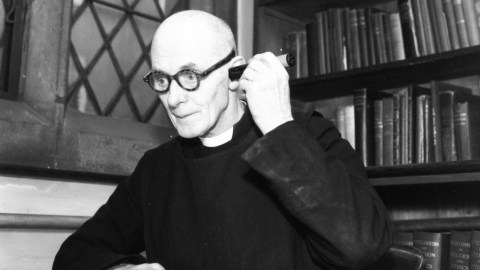Can Science and Religion Get Along?

Debates between science and religion are longstanding. The religious like to point to scientific evidence that backs their belief system in some manner, shunning or ignoring conflicting evidence. Scientists often (though not always) play down the religion question. Some look for synchronicity; others, conflict. There is no clear-cut response.
A recent study shows that that might be by design—brain design, that is. The research verifies the opposing domains hypothesis: the more your beliefs are associated with the social and emotional domains of cognition, the less you’re utilizing analytical thinking. Religious belief is thus implicated with social-emotional cognition.
The researchers first asked if belief is generally linked to social and emotional cognition, and if so, which specific dimension(s). They followed that up by investigating if the tension between analytical thinking and religious belief still holds up after the social-emotional cognition piece is taken into account. Their conclusion is that ‘moral concern and analytical thinking are in tension.’
In theory this makes sense: you’re most likely not going to believe in a metaphysical entity if you’re consulting logic. Faith is no justification for lack of inquiry; if facts don’t bear a hypothesis out, it’s impossible to maintain belief without evidence. To some, this is the exact definition of faith. The researchers would likely argue that they’re more engaged in their social-emotional domain.
But it’s hard to apply these ideas to actual social evidence—which, admittedly, requires analytical thought. Anthropologists and neuroscientists, among others, have shown that the moral dimension is not relegated to the religious alone. It is possible to be socially and morally engaged without holding metaphysical beliefs. Correlation does not imply causation.
Ethologist Frans de Waal believes religion merely exploited our innate trait toward empathy. In Our Inner Ape, he writes that the Christian impulse toward kindness and charity are extensions of our evolutionary nature.
It is good to realize, though, that in stressing kindness, religions are enforcing what is already part of our humanity. They are not turning human behavior around, only underlining preexisting capacities.
De Waal is not criticizing religion, just pointing out that innate emotions did not develop because of faith. He entertains the well-known example of a room of crying toddlers: once one begins, a chorus ensues. One hears, then empathizes. This emotional matching is shared by rats, dogs, elephants, and monkeys.
This does not conflict with the research above, though it does call into question the researchers’ distinct categorizing of social-emotional and analytical cognition. The triune brain model showed long ago that emotions and reason are processed in different neural regions.
We would also need to question how a religious person, supposedly operating in social-emotional cognition and thus focused on morals, could deny homosexuals the right to marry or demand that a woman who was raped bear the child. Such an example might be on the fringes of religious belief—though given some polls, not exactly—but it does hint at a merging of these separate domains: you have to reason that your belief system states that everyone should bear a child under any conditions, yet the foundation of that system relies on metaphysical speculation. At some point in the chain of command wires are crossed.
There is much knowledge to be gained from a dialogue between science and spirituality—the neurological and physical benefits of yoga and meditation being one example. Likewise, those looking for existential comfort from their beliefs during times of hardship should be allowed their place of refuge, regardless of whether it is ‘true.’
Problems arise when these two domains intersect and collide in public policy. The teaching of creationism as a legitimate science is but one glaring example. Whatever neural regions light up in a laboratory when contemplating different ideas is one thing. In practice, the relationship between spiritualty and science is often not pretty, and that’s a shame, because there’s much to be learned from whatever domain you happen to spend most of your time inside. You just have to cross over to the other and take in the view.
—
Image: Pedro Ugarte / Getty Images
Derek Beres is a Los-Angeles based author, music producer, and yoga/fitness instructor at Equinox Fitness. Stay in touch @derekberes.





